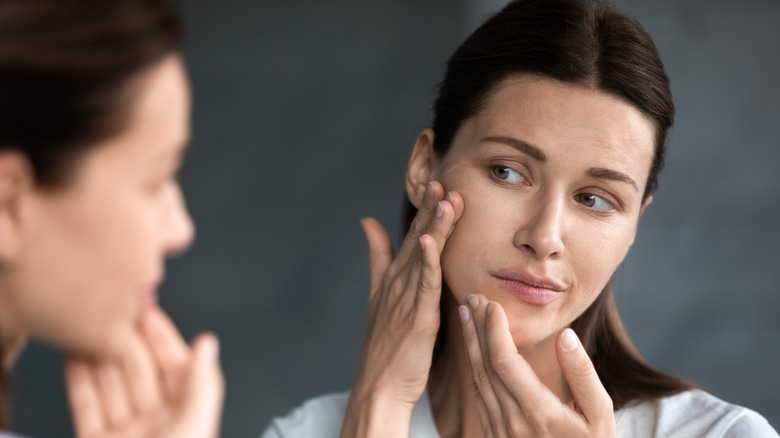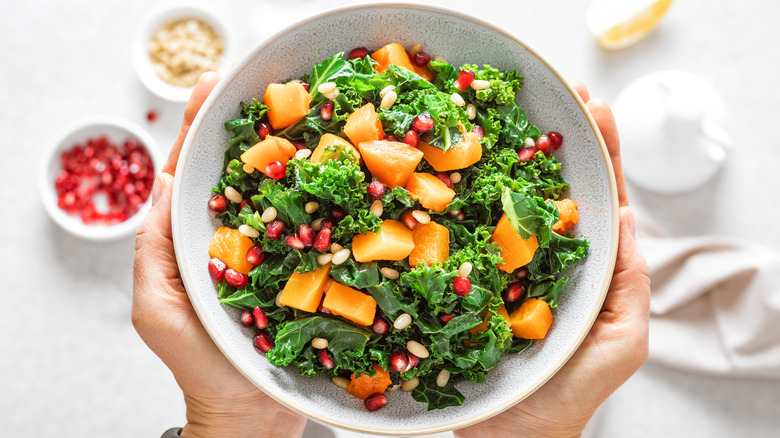How Consuming Kale Can Improve Your Skin
Taking good care of your skin isn't just brazen vanity. Of course, we want to look and feel good, and most of us dedicate daily time to grooming and creating a personal aesthetic that matches our style or mood. In fact, people spend between 30 minutes to nearly an hour on things like overall appearance, hair, and skincare, according to The Washington Post's analysis of data from the American Time Use Survey.
But before we assume that attention to grooming is just another way that trends — like Barbie's influence on beauty — play out in everyday life, the experts say otherwise. Take, for example, National Institutes of Health (NIH) dermatologist Heidi Kong. In an NIH feature, she explained that the skin is a crucial protective barrier and, as a result, reacts to what's happening both inside and outside our bodies; attention to skincare is an important step in self-care.
Kong studies microbiomes — itty bitty bacterial organisms found everywhere, including on our skin and in our digestive tract. And there's a growing awareness around microbiome-centric skincare (via CNN) — the connection between what we eat and the health of our skin. Luckily, you don't need to be a smarty-pants researcher to benefit from this; just eat some skin-benefitting foods.
Focus on the gut to achieve healthy skin
These things — bacterial microbiomes — live on our skin and in our guts, so, how can we maintain a healthy balance? Medical News Today explains that maintaining a healthy gut microbiome reduces the body's inflammatory reaction, including common skin concerns.
"There is a clear link between skin inflammation and changes in the gut microbiome due to food intake," according to Dr. Samuel Hwang, who discussed the topic with the outlet. He explained that a diet too heavily skewed toward unhealthy fats and sugar can lead to skin and joint inflammation issues. It's important to note — according to Dr. Mike Hansen — that when harmful bacteria take over the gut, they can break down the lining and cause chemical components to leak out. This triggers inflammatory responses throughout the body, which can include skin issues like acne or even eczema (via The Secret Life of Skin).
But Dr. Hwang's research shows it's not difficult to reverse these issues through diet change, advice echoed in a feature by The Washington Post. With this in mind, you can improve the balance of good bacteria in your gut by reducing sugar and unhealthy fat intake and increasing the variety of veggies, nuts, and seeds you consume. Remember, good bacteria thrive on fiber-dense foods. Now, you may be wondering, which foods are the most beneficial in terms of skincare? Kale may just be your answer.
Among leafy greens, kale is king
Most of us like to consolidate the wisdom of science into easy-to-follow, bite-sized wisdom nuggets. If you want to start slow and easy, there's one vegetable that repeatedly gets gold stars — kale.
Healthline raves about kale's densely-packed nutritional profile and its ability to reduce skin hyperpigmentation. Kale is also known to help regulate the all-important balance of the body's microbiome and reduce inflammation issues (via NIH). In another science is cool moment, Men's Journal explains that when the body dissolves leafy greens, sugars called sulfoquinovose (SQ) are part of the byproducts. That unique leafy-green brand of SQ sugar helps feed the good bacteria, keep the biome happy, and skin healthy. But, let's say you're in the produce aisle, overwhelmed with leafy-green options. Is Kale the best super green?
Eating a diet with a variety of leafy greens is fantastic, but Healthline's summary serves as a reminder that kale is the most nutrient-packed of all the greens. The vegetable not only benefits the skin in terms of vitamins, minerals, and antioxidants, but also plays a vital role in microbiomes and a healthy gut-skin relationship.


